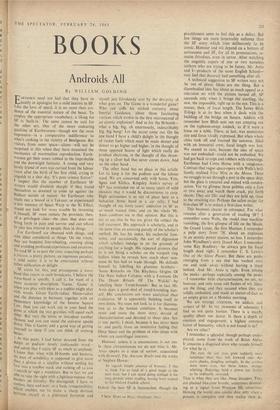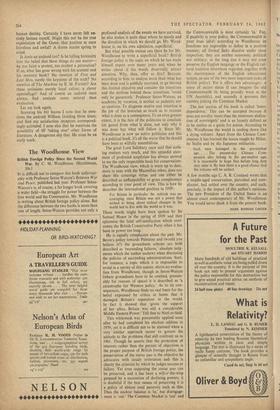BOOKS
Androids All
By WILLIAM GOLDING
EARTHMLN need not feel that they have to justify or apologise for a mild interest in SF. Like the love of speed, it is no more than evi- dence of the essential nature of the beast. To employ the appropriate vocabulary, a liking for SF is 'built-in.' The same cannot be said for the other sex. One of the more endearing qualities of Earthwomen—though not the most impressive—is a comparative indifference to what's cooking in the vicinity of Betelgeuse. But visitors from outer space—aliens—will not be surprised at this when they have examined the mechanics of mammalian reproduction. Earth- women get their noses rubbed in the improbable and the downright fantastic. A young and very lovely friend of ours was carried from the labour room after the birth of her first child, crying in anguish to a shut sky, 'It's pure science fiction!' I suspect that the number of Earthmen SF Writers would diminish sharply if they found themselves so doomed to come up against the beldam secrets of nature. An Earthman who really met a Smoof or a Taksaur, or experienced a few minutes of Space Warp or the Xi Effect. would not look for more trouble by inventing rt himself. SF must remain the province, then. "I a privileged class—the class that does not bring forth in pain and sorrow and can -afford In take less interest in people than in things.
For Earthmen are obsessed with things, and with ideas considered as things. On the whole, they are happiest free-wheeling, coasting along and avoiding profound experiences and emotions. hi read SF is to pass the time, expecting perhaps frisson, a pretty picture. an ingenious paradox. a. mild satire: it is to be entertained N% ithout either edification or delight.
SF exists for this. and presupposes a wave- band that reacts to such broadcasts. I believe the wave-band is specific. I call it, for want of a more accurate description. 'Game.' is When you play with ideas as a sophist might play wall words. Given Earth-radius, Moon-radius and the distance in between, together with an elementary knowledge of the Inverse Square law. then you can work out in your head the Point at which the two gravities will equal each other. But vary the terms or introduce another element and you can stand the universe upside down• This is Game; and a good way of getting Yourself to sleep if you can think of nothing better.
At this point, I had better descend from the
Pulpit or podium lovely foshionabie word-- 411d admit that I enjoy SF as much as anybody. I know that, what with H-bombs and bacteria. no man of sensibility is supposed to give more 91an a glance at a satellite without settling his lace into a sombre mask and rushing off to join :1 march or sign a manifesto. But in fact we are 4ble to take the sight with a lightheartedness that borders on frivolity. We distinguish. I have to confess. here and now, to a basic irresponsibility which enables me to make a sharp division between myself as a pint-sized Jeremiah and myself just frivolously sent by the dexterity of what goes on. The Game is a wonderful game! Who can stifle his wicked curiosity about Inertial Guidance, about those fascinating vortices which evolve in the first microsecond of an atomic explosion? And as for the H-bomb— what a big, big, oh enormously, indescribably' big, big bang! Let the secret come out. On the one hand I have a child's delight in the thought of rocket fuels which must be made denser and denser to go higher and higher, in the thought of those opposed beams of light which really do produce electrons, in the thought of this throw- ing up a silver ball that never comes down. And on the other hand . . .
The other hand has no place in this article. Let us keep it for the podium and the labour ward. We are concerned only with Sorns, Yots, Sgees and Xlithcs. Kingsley Amis's survey of SF* has reminded me of so many years of mild pleasure that it would be discourteous to carp. High seriousness is as out of place here as a Salvation Army band at a car rally. I had thought of my forty years' addiction to SF as so much wasted time; and on the whole Mr. Amis confirms me in that opinion. But this is not to say that he has not given the subject the full treatment. His approach is scholarly, and at the same time an amusing parody of the scholar's method. He has his index, his recherché foot- notes, and occasionally the sort of digression which scholars indulge in on the grounds of an' thing for a laugh. His repeated protests that he is not being a scholar on the warpath ring hollow when he reveals how much sheer non- sense he has had to wade through. He defends himself by labelling his glummer brothers— 'Some Remarks on The Rhythmic Origins Of The 11 est Indian Calypso, with a Footnote On The Drum Rituals Of The Wakiki'—by labelling them 'Trend-hounds.' But in fact Mr. Amis does a good deal of trend-hounding him- self. His conclusions are more analytical than evaluative. SF is apparently building itself its own limits. We must not look to it for illumina- tion as to the human condition. It becomes more and more the short story, devoid of characterisation and devoted to sheer idea. Sex out, partly• I think, because it has never been in; and partly from an instinctive feeling that Deep Space and the problem of who sleeps with whom are centrifugal interests.
Humour, unless it is unconscious, is out too. In these circumstances we do not miss it. Mr. Amis speaks as a man of sorrow, acquainted with Beowulf, The Aircrew Rin'le and the works of Stephen Hawes: As regards simple absence of humors•. I like to think I'm as fond of a good laugh as the
nest man. but I can stand doing without it for long periods when reading. having been trained in the Oxford English school,
Indeed the best SF is humourless. though the • Nr NA NI ,tes in Ho (Oollanci. 16s.) practitioners seem to feel this as a defect. But few things are more lamentably unfunny than the SF story which tries deliberately to be comic. Humour and wit depend on a bottom of seriousness and SF, for all its protestations, re- mains frivolous, even in terror. After watching the ungainly capers of one or two nameless authors who are trying to be funny, Mr. Amis and I—products of the same English School— may feel that Beowulf had something after all. A technical suggestion to SF writers may not be out of place. Ideas are the thing. But a disembodied idea has about as much appeal as a television set with the picture turned off. SF succeeds only when it brings the startling, the new, the impossible, right up to the eye. This is a matter, then, of focal length. The James Blish Trilogy is at its best when it deals with the building of the bridge on Saturn. Addicts will remember how Blish sent our eye creeping out on the typhoon-swept icedeck, as if it were a louse on a table. There, at last, was monstrous size and force vividly expressed. But when %% hole cities took off and roamed the universe, filled with an immortal crew, focal length was lost. We ceased to care, because the idea of space was not embodied--could not be embodied. We had got back to cops and robbers with trimmings. Earthman had Come Home with a vengeance. Contrast that vague space-opera with Wells's bril- liantly realised First Men in the Moon. There we struggle to see through a port in the space ship; but the glass is smeared and misted with conden- sation. Yet we glimpse those pebbles only a foot or two away and watch them crack, put forth shoots. They are life; and they are held up, close to the straining eye. Perhaps the safest recipe for first-class SF is to seduce a first-class writer.
This becomes clearer in retrospect. For what remains after a generation of reading SF? I remember some Wells, the model time machine vanishing, the first glimpse of life on the Moon, the Grand Lunar, the first Martian. I remember a pulp story from '38, about an explosion in an atomic power station, no less. I remember John Wyndham's story Dumb Mart. I remember some Ray Bradbury --he always gets his focal length dead right. I remember C. S. Lewis's Out of the Silent Planet. But these are peaks emerging from a sea that has washed over me and sunk away without leaving a trace behind. And Mr. Amis is right. Even among the peaks—perhaps especially among the peaks - I remember little characterisation, no sex, no humour, and only some odd flashes of wit. Ideas are the thing; and they succeed when they are solidly embodied, and made as matter-of-fact as an empty grate on a Monday morning.
We are strange creatures, we addicts and writers of SF. In my moments of solemnity. I find us not quite human. There is a mayfly quality about our dance. Is there a depth of emotion and engagement, a highest common factor of humanity. which is not found in us?
Are we other?
I remember a splendid. though perhaps under- played, scene from the work of Brian Aldiss, It concerns a disguised alien who reveals himself for what he is.
The eyes. the just eyes, grew suddenly more luminous--then they fell forward onto Ap- eye's cheeks, dangling springily. In the ca'ities were more eyes. but these lenses. strange. whirling. flickering. held a power too fearful to he ordinarily revealed.
That is what they are like, these invaders. They are planted like, time bombs; sometimes detonat- ing at a signal from Procyon HI, sometime, blowing the world into cosmic dust only %%hen a process is complete and they realise their in-
human destiny. Certainly I have never felt en- tirely human myself. Might this not be the true explanation of the Game, that pastime at once frivolous and awful? A dozen stories spring to mind.
Is Amis an android too? Is he lulling humanity into the belief that these things do not matter— by too faint a protest, too modest a peroration? If so, what has gone wrong with his scanner and his memory bank? No mention of First and Last Men, surely the keystone of the arch? No mention of The Machine by E. M. Forster? Are these omissions merely local colour, a clever camouflage? And of course an android must always find analysis more natural than evaluation.
Let me look again.
Scanning his 161 leaves I note that he men- tions the android William Golding three times, and find my satisfaction receptors correspond- ingly activated. I note also that he mentions the possibility of SF 'taking over' other forms of literature. A dangerous slip that. He must be an early mark.







































 Previous page
Previous page